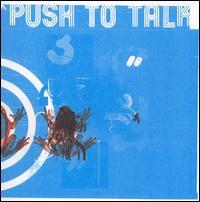Push to Talk's self-titled effort is one of those albums that falls in the realm of "I know I should like this, but it's really missing a certain something." The record has that mellow, dream-like quality to it, capable of evoking both deep thought or deep sleep, depending on your disposition at the time, but much of it fails to have the capacity to really grab, and make somebody absolutely need to hear the rest of the record, or song even.
The dreary atmospheres constantly teeter on the cusp of something more, never fully realizing the potential that this group of musicians brings into the fold. A band like this needs a strong vocal presence first and foremost, and that is well provided by way of singer James Leste. Sounding like a mesh in vocal chords between Cass McCombs and Thursday's Geoff Rickley, Leste croons his way over the dark guitar tones and occasional synth beats to lay down a solid basis, a basis that the rest of the band has trouble fully expanding on. As I said before, it's not the individuals the problem truly lies with, it's the group as a whole, for a gross inability to come up with anything truly compelling.
This really may be coming off a bit harsh, though. None of the songs are bad, just not particularly memorable. It's troubling, too, because the album actually does present a good amount of variety. The whimsical nature of "Lose My Head," that leads in to an expansive middle of the song, complete with much louder riffs and tactful synth, contrasts well with "Yes Takes a No," which provides a much bouncier chord progression and some light "whoo ooo"-ing. A good portion of the other tracks, however, despite not even being formulaic, fall into much the same rut. Morose vocals, light guitar splashes,
and a melodic undercurrent -- it just gets tough to differentiate what songs are which after a while. There are those 4 or 5 that are easy to detect against the others, and the rest that bleed together in time. So that aforementioned variety actually becomes lost against the ebb and flow of the album.
A definite mood record, but with an identity crisis, not ever sure what type of mood it's trying to evoke.
